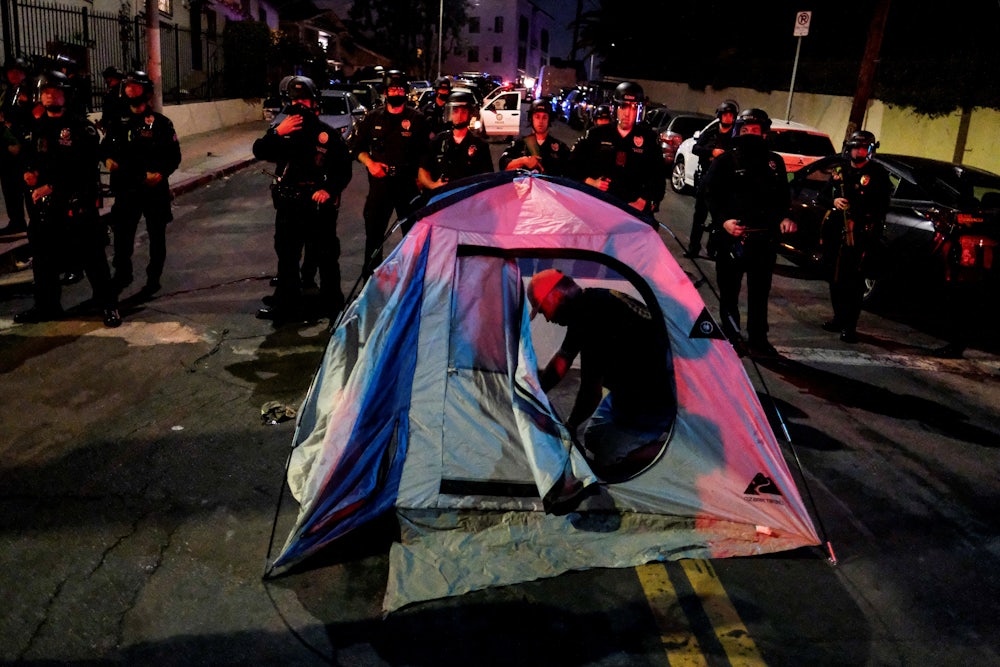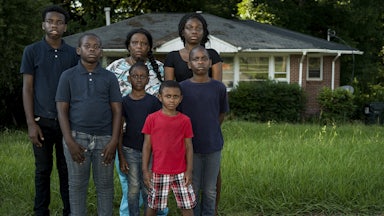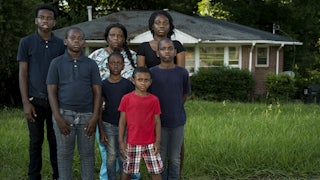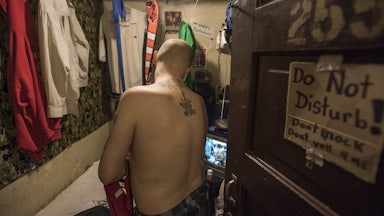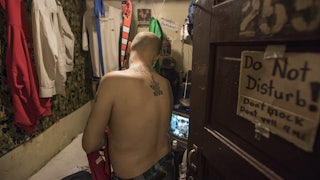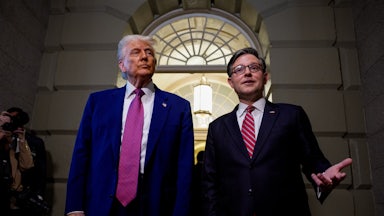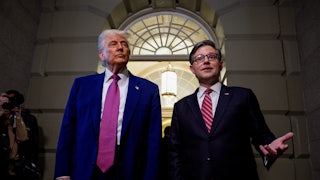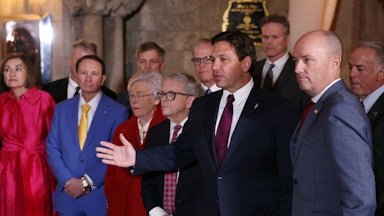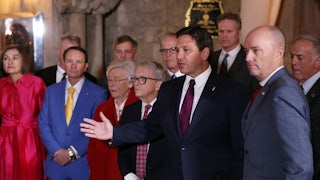Some of the richest people on earth landed a blow against some of the poorest, in ostensibly deep blue Los Angeles last week, as Mayor Eric Garcetti signed legislation almost unanimously approved by the City Council criminalizing homeless encampments in many places throughout the city. It’s the latest move in a vicious top-down class war in Southern California that’s increasingly targeted the already sizable and growing unhoused community living there.
Some 66,000 people are estimated to be living without housing in Los Angeles, a truth inseparable from the trappings of unimaginable wealth just beyond the tent cities dotting the metropolis. Since the late 1970s, many factors have converged to drive homelessness that largely reflect the rise of the neoliberal order, including disinvestment from public housing and the demise of single room occupancy units in favor of more lucrative offerings, the shuttering of public residential hospitals with no alternative plan for the community they served, and social chaos associated with drugs and mass incarceration.
But for the past few decades, housing costs have driven the crisis, according to Nan Roman of the National Alliance to End Homelessness: “There were people with mental illness, lots of people with substance abuse disorders, lots of poor people, all the same issues, but there was not widespread homelessness.… What changed was the housing.”
The skyrocketing cost of shelter was a function of the shift in power away from labor toward capital during the same era, as changes in the financial sector and local politics that favored real estate development and predatory lending translated into veritable explosions in wealth as the gap between the rich and poor in America began to widen. Those on the winning end in Los Angeles have seen their net worth rise stratospherically, rewarding property owners at the expense of renters and unhoused people in need of social services: The passage of Prop 13 in 1978 famously froze property taxes from the time of purchase and depletes state coffers of billions per year; laws passed in the 1990s make rent control illegal.
As some people got filthy rich, others got regular rich: Twenty-five-year home prices in Venice have risen from $300,000 to $2 million. Rent has increased by 65 percent in only 10 years, and the city’s housing voucher program has been closed for the same amount of time. This leaves the poorest and most vulnerable people with little choice but to sleep in cars or tents.
While cities like New York have laws mandating shelter space for the homeless, Los Angeles does not. Moreover, the shelters that are available often enforce such draconian rules—requiring residents to get rid of their possessions before entering or to live separately from pets or partners, for example—that they wouldn’t be a feasible option for most.
And for those who do have the option of shelter, the solution is a fleeting one: Only 15 percent of residents ever transition into permanent housing, with the majority quickly cycling back to the streets—a reality that puts widespread reluctance to upend one’s life to move into a temporary shelter in the first place into context. While city voters overwhelmingly passed measures in 2016–17 to establish and fund permanent housing for homeless people, multiple initiatives have been decimated by well-funded lawsuits and broad political resistance from wealthier locals. To date, only a few hundred out of 10,000 proposed units have materialized.
Since the ballot initiatives to establish permanent housing passed, the unhoused population has only grown—and it’s been subjected to so-called “street sweeps” at the hands of police who serve the interests of rich people who oppose living near both permanent supportive housing and encampments. Anti-homeless policing has come into especially sharp focus in recent years, as the city’s rising left has coalesced around housing issues, and the lead-up to the 2028 Olympics—those, again—has housing and homelessness advocates on high alert not only for more brutal policing aimed at “cleaning up” the areas surrounding the coming Games but also for shady landlords hell-bent on ousting longtime tenants to make way for Airbnbs. One particularly high-profile incident occurred this spring, when riot police attacked protesters and cleared a long-standing encampment in Echo Park.
These tensions have only heightened in recent months, as encampments grew during the pandemic; untold numbers of people seem potentially poised to join them when eviction protections end in September. At the same time, monied interests are pouring more and more resources into their no-holds-barred fight against the city’s most vulnerable residents. Just-short-of-a-billionaire Jeffrey Katzenberg, who most recently set a small fortune on fire in the failure of Quibi, reportedly met personally with several city council members to advocate for measures targeting encampments that sound suspiciously similar to those passed last week.
Similarly deep-pocketed donors are targeting the local elected officials who are most supportive of L.A.’s homeless community: Councilperson Mike Bonin, who has recounted his own experiences being unhoused in the 1980s and been a stalwart opponent of some of the worst anti-homeless measures during his tenure, is facing a dubious recall election at the hands of an organized campaign whose website scaremongers about Bonin’s stances on housing: “Under Mike Bonin’s watch, the humanitarian crisis of the homeless population is growing exponentially.… Fires. Struggling local businesses.… We feel afraid to visit public beaches and community parks.” A parallel recall effort has also been lobbed against new Councilperson Nithya Raman, who was propelled to office last year by a lefty coalition, despite the efforts of Nancy Pelosi and other prominent establishment Democrats who went all out to help her opponent. Not coincidentally, Bonin and Raman were the only two council members to vote against last week’s new law.
What Katzenberg and his allies have won—what they’ve been able to capture the political system to do—is abhorrent. Astonishingly rich Angelenos have extracted fortunes from a system that’s relegated tens of thousands of their neighbors to the streets. They’ve seen their capital incomes and property values soar as rent prices claim outsize chunks of workers’ incomes. They’ve fought tooth and nail against new supportive housing, in the name of fighting the depreciation of their own property values and their neighborhoods’ affluence, to keep as many people as possible living in tents, only to launch new crusades to get rid of them at gunpoint.
More than 60,000 Angelenos now have nowhere to go. Some of them will filter in and out of shelters. Plenty others will be charged with camping violations and wind up in jail or prison. But whatever happens to them isn’t the concern of the richest people in liberal California, and they’re not shy about letting you know.
